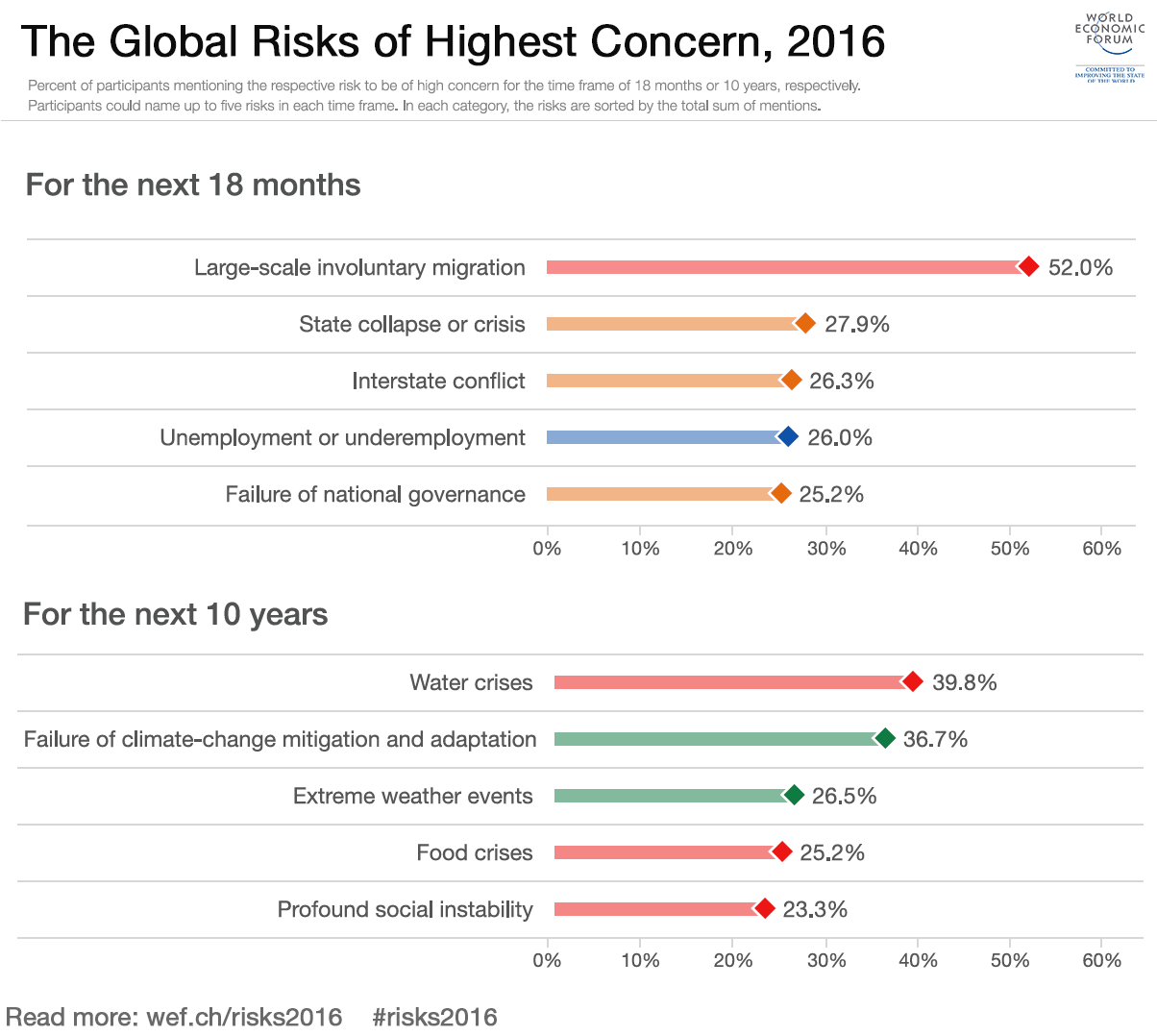Global risks: many of them are already here

Image: REUTERS/Fabrizio Bensch
Sharan Burrow
Visiting Professor in Practice, Grantham Research Institute on Climate Change and the EnvironmentFive significant risks highlighted in the Global Risks Report 2016 are on the doorstep of millions of working people around the world: illicit trade, extreme weather events, the failure of national governance, large-scale involuntary migration and large-scale cyberattacks. Many of these risks are already taking their toll today.

While the risk of further economic crises and failure of financial institutions is significant, national and global institutions do have some mechanisms in place to step in and respond, if they choose to act.
However, there is little political will to tackle the five risks that are already being experienced by working people and the prognosis for the coming year is an alarming escalation.
The impact of each is potentially devastating: we could see an increase in the oppression of people, a loss of lives and livelihoods, a rise in xenophobia, and a breakdown of trust between people and their governments, along with a breakdown in relationships across nations.
Illicit trade corrupts corporations and governments alike, allows dictators to survive and obscures oppression, including modern day slavery. Many governments and corporations take no moral responsibility for the enslavement of migrant workers, and freely do business with states built on the back of slave labour. Illicit financial flows and tax evasion are ignored in the interests of some nations and their corporations, stripping the tax base that is so vital for essential services.
The increase in extreme weather events is already locked in due to our failure to transform industries in response to climate change. While the Paris agreement has provided fresh optimism, the battle to wind back greenhouse gas emissions is just beginning and the loss of lives and livelihoods over the next decade will be devastating. Economically, it may create an uninsurable world, simply isolating many millions of people and their communities.
The failure of national governance is increasing in both conflict-ridden countries and in those that face economic crisis and instability caused by debt, unemployment, and societal breakdown around land, energy and epidemics. If multilateral institutions cannot bring about peace and the rule of law because of the vested interests of their members, then both national democracy and global governance will continue to be rocked by crises.
Large-scale involuntary migration is playing out before our eyes, with the worst refugee crisis since the Second World War, and most governments are doing too little to deal with it. The situation in Europe is set to become global, with climate refugees adding to the already growing numbers of migrants fleeing conflict or looking for better economic opportunities. Governments such as Germany and Sweden are taking responsibility for the human crisis and affording safe haven and the right to work, but are being brought down by the narrative of xenophobia and fear from extreme political parties, while those building fences and lining their borders with armed forces are thriving.
The future for rights, respect and inclusion of all in our nations looks bleak.
Large-scale cyberattacks are also a tragedy in the making. The democratic openness of the net is already at risk from vested interests seeking control and at the same time the risk for cyber terrorism against vital infrastructure is increasing every day. The technology of the future relies on massive internet capacity so it doesn't take a horror movie to paint a possible future.
The challenges are clear. The choice rests with all of us to either build an integrated society where all people have rights, respect and equal opportunity or build walls of isolation and opportunism, where the few protect themselves. We are indeed at a tipping point and the conversations taking place in Davos will hopefully help shape the right path.
The Global Risks Report 2016 is available here.
Author: Sharan Burrow, General Secretary, International Trade Union Confederation
Don't miss any update on this topic
Create a free account and access your personalized content collection with our latest publications and analyses.
License and Republishing
World Economic Forum articles may be republished in accordance with the Creative Commons Attribution-NonCommercial-NoDerivatives 4.0 International Public License, and in accordance with our Terms of Use.
The views expressed in this article are those of the author alone and not the World Economic Forum.
Forum Stories newsletter
Bringing you weekly curated insights and analysis on the global issues that matter.